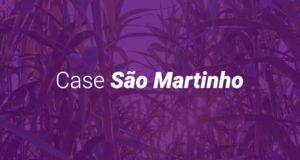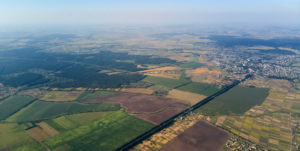Caramuru bets on ESG, conquers 4 new markets and grows its revenue by 39% in 1 year.
7 de June de 2021
Tempo de Leitura: 4 minutos
How Caramuru Alimentos understood and knew how to take advantage of the opportunities of new ESG concerns to win new international business.
Listening to Market Demand
“The demand for sustainability precedes the conversation about the product. Buyers want to know how it is made and where it comes from.” Davi Depiné, development director of Caramuru Alimentos
Caramuru Alimentos is the main Brazilian group in soybean, corn, sunflower and canola processing. In addition to commodities, it operates in the livestock, industrial, biodiesel and logistics segments. It is responsible for 12% of corn crushing and 4.3% of soybean processing in Brazil, therefore the way the company handles its extensive and robust operation directly affects the group itself, the environment and anyone with any kind of connection to them – even the end consumer.
Being an industry giant has its advantages, but it also brings challenges. To come face to face with a market that increasingly demands not only commitment to sustainability but also expects proof of compliance from the entire production chain, certainly makes monitoring more than 14,000 grain production lands one of those challenges.
However, if it is done successfully, the traceability of the chain can be a great competitive advantage in national and international markets today. And Caramuru was able to identify this opportunity.
Sustainability as a Competitive Strategy
“Caramuru operated with tabular data management, which could generate nonconforming territory. That was until Safe was implemented. Agrotools allowed the company to map – perhaps for the first time – the entire portfolio of suppliers it has in the country.” André Luís, Agriculture Manager of Caramuru Alimentos
For three years, the company sought to monitor its supply chain by consulting lists of environmental and social embargoes, but from 2019 onwards it started using SAFE, from Agrotools. With the help of satellite images and in a 100% digital manner, the solution allows the supplier to be evaluated based on up to 45 different ESG criteria.
There are several ways to access relevant criteria: Inpe’s Prodes, which carries out satellite monitoring of deforestation in the Legal Amazon and Cerrado, the analysis that allows the verification of overlapping crops in conservation units, indigenous lands and recent deforestation, in addition to of CPF* embargoes for environmental or social issues. In addition, social-oriented data are also provided, such as the “dirty list” of the Public Ministry of Labor, which indicates whether there are slavery-like practices in a specific location.
By obtaining a holistic view of all its suppliers, the company is able to make more informed choices that are in line with its business and brand strategies.
In this case, Caramuru swiftly managed to certify its operation as sustainable, linked to reliable data. The digital solution also makes it easier for the brand to make agile, smart and safe decisions about the entire chain, with just one click.
39% increase in revenue in one year
Growth expectation of 15% in exports
4 new markets
The work of environmental and social monitoring of the 14,000 production lands that supply grain to the company has already borne fruit: of the 5,500 producers with which the company interacts, 74% have reached the maximum level of socio-environmental compliance.
The group was also able to capture new markets, and started exporting to Canada, Australia, Mexico and Ecuador. With more customers, Caramuru expects to see its export revenue grow by up to 15% in 2021. This year’s total revenue must be close to R$5.9 billion, almost R$1.7 billion, or 39% more than in 2019 – with soy derivatives accounting for 89% of the total.
And production chain transparency also offers other competitive advantages to the brand.
Still on international expansion, monitoring the production chain also allows the company to boost another project: the identification of producers of non-GMO soy, which is strongly demanded abroad. Non-GMO soy represents 30% of the total soy purchased by Caramuru and the goal is to increase the amount originated from conventional grain by up to 20% in the 2020/21 harvest.
*The CPF Number is the Brazilian “Natural Persons Register”. It is the Brazilian individual taxpayer registry identification since its creation in 1965.
Does your company also want to use an ESG strategy for business expansion? Meet SAFE, our digital solution for supply chain management.





